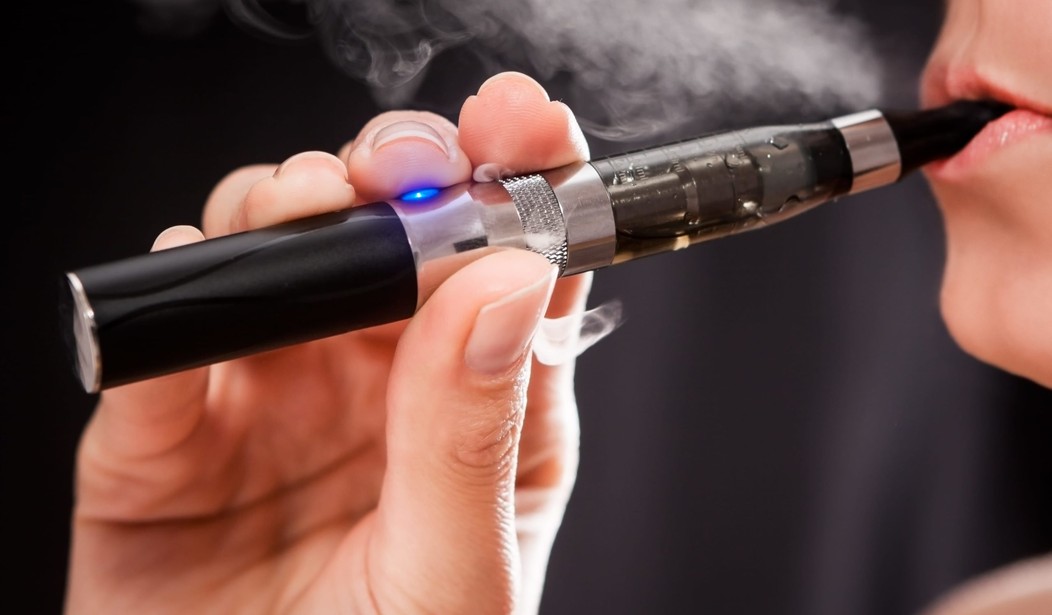Axios is reporting that Dr. Scott Gottlieb and the FDA have presented the White House with their big plan to restrict the sale of e-cigarettes in convenience stores.
Gottlieb met this afternoon in the West Wing with officials from the Domestic Policy Council, the White House counsel’s office and the National Economic Council. Joe Grogan, the director of the Domestic Policy Council, arranged the meeting.
Gottlieb has been clucking and fussing about the “epidemic” of teenagers illegally acquiring and using e-cigarettes. There are age restrictions on selling e-cigs to minors and the FDA has responded to this alleged “epidemic” not by cracking down on the retailers breaking the law and selling to underage consumers, but by cracking down on the manufacturers of the product in question. All while the teen analog smoking rate is declining.
Studies show that using an e-cig like Juul is far less hazardous than smoking combustible cigarettes. Jacob Sullum over at Reason explains:
A randomized clinical study that was discussed at a conference on Saturday found that smokers who switch to Juul e-cigarettes see the same reductions in biomarkers of exposure to hazardous chemicals as smokers who quit without vaping. The study, sponsored by Juul Labs as part of the documentation it will need for the Food and Drug Administration’s approval to keep its products on the market, provides further evidence that vaping dramatically reduces the health risks that smokers face.
The researchers randomly assigned 90 smokers to vape instead of smoking, to stop smoking without vaping, or to continue smoking. After five days, the urine and blood levels of eight biomarkers of exposure (BOEs) were reduced by 85 percent in the vaping group, compared to 85.3 percent in the abstinence group. The difference between the two groups was not statistically significant. BOE levels in the group that continued to smoke, meanwhile, were 14.4 percent higher than the baseline results (which were obtained from all subject after 12 hours of abstinence at the beginning of the study).
So why on earth would the government want to make it harder for people to acquire a tool that will help them quit smoking? Perhaps the FDA is merely a victim of an expensive anti-vaping PR campaign.
With such flat-out lies passing for medical advice, it is no wonder that Americans are confused about the relative hazards of smoking and vaping. In one survey, the share of adults who incorrectly said vaping is as harmful as or more harmful than smoking tripled between 2012 and 2015, from 13 percent to 40 percent. In a 2018 Harris poll, 43 percent of adults erroneously thought e-cigarettes are more harmful than the combustible, tobacco-containing kind. This kind of misinformation, to the extent that it discourages smokers from switching to vaping, can be deadly.
Or perhaps the FDA just wants to take the side of Big Pharma, an industry that would rather you get your nicotine replacements from one of their ineffective products, like nicotine gum or the nicotine patch.
The details: Gottlieb has foreshadowed a larger plan to reduce smoking rates. But the plan he gave the White House today is only his narrower plan to restrict the sales of flavored e-cigarettes — to keep them away from children and teenagers.
- How the plan would work: The FDA would stand on shaky legal ground if it imposed an outright ban on the sales of flavored e-cigarettes in convenience stores. But what the agency is doing amounts to an effective ban, with less legal exposure.
- Under the new FDA enforcement policy, if a store wants to sell flavored e-cigarettes, it has to ask people for the ID cards before they enter the store. (The definition of “flavored” excludes tobacco, mint and menthol flavors.)
- That means if a gas station wants to sell flavored e-cigarettes, it would need to build a separate room and ask people for their IDs before they enter the room. (It could also come up with other schemes, but would need to verify the age of the shopper before they browse the shelves.)
When we shared our reporting with the FDA, spokeswoman Jennifer Rodriguez emailed: “I can confirm that Dr. Gottlieb was at the White House today, but cannot confirm any details. You’ll need to contact White House for questions about any discussions that may have taken place.”
I have written before about how the FDA is particularly concerned with flavored e-cig products, claiming the flavors are used to lure underage consumers into using and addicting themselves to vaping. But flavored e-cigs help smokers quit their deadly smoking habit. I hope the White House treats these recommendations with caution.









Join the conversation as a VIP Member